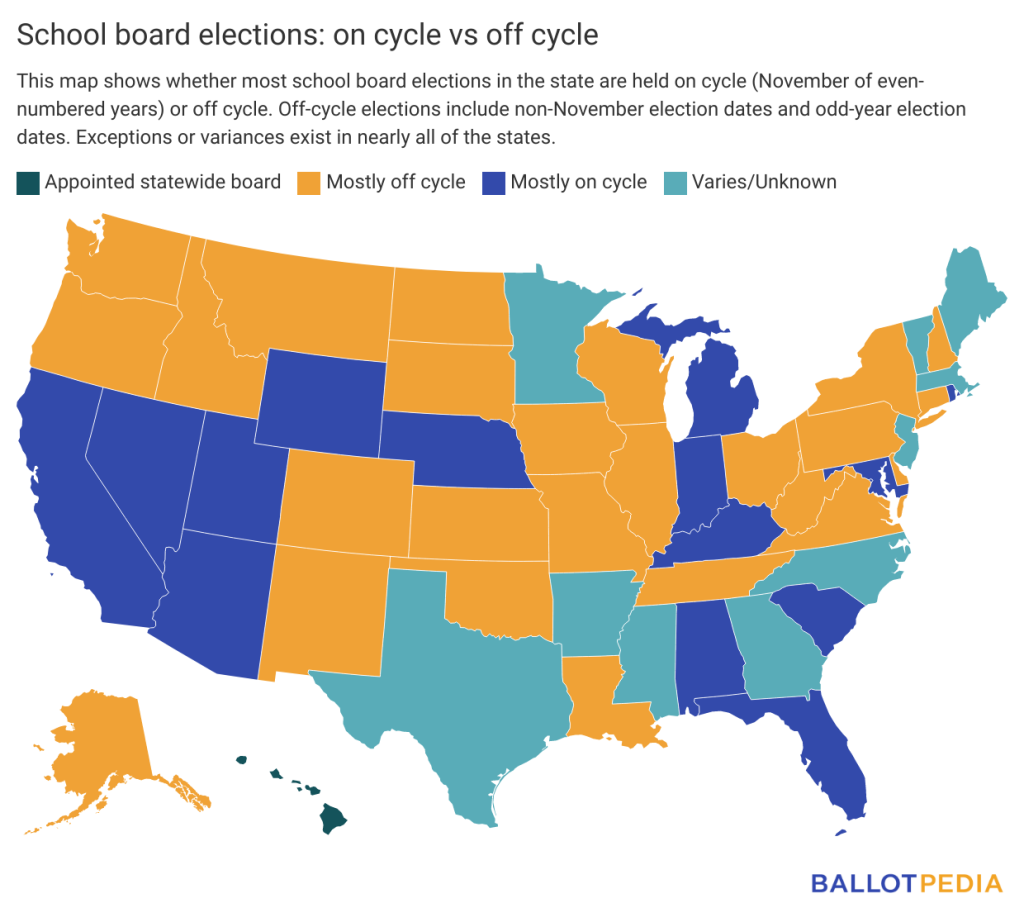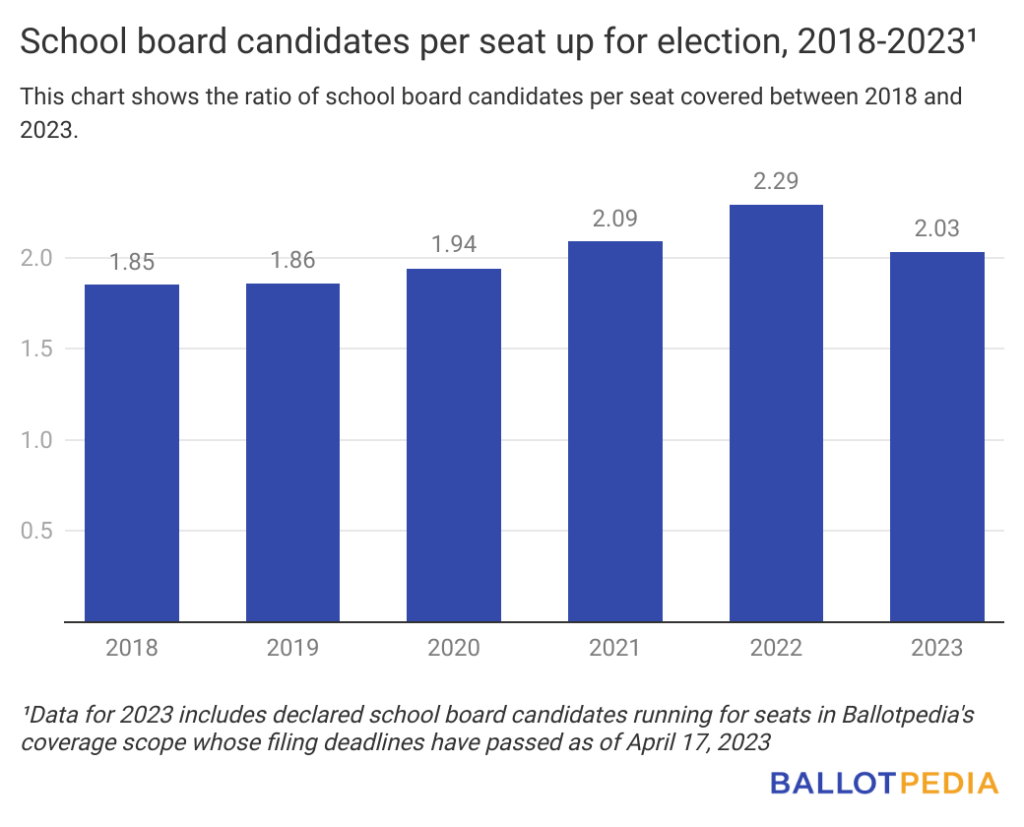Welcome to Hall Pass, a newsletter written to keep you plugged into the conversations driving school board politics and governance.
In today’s edition, you’ll find:
- On the issues: The debate over Satanist after-school clubs
- Share candidate endorsements with us!
- School board filing deadlines, election results, and recall certifications
- In almost half of states, school board elections are most commonly held off-cycle from federal elections
- School board candidates per seat up for election
- Extracurricular: education news from around the web
- Candidate Connection survey
Email us at editor@ballotpedia.org to share reactions or story ideas!
On the issues: The debate over Satanist after-school clubs
In this section, we curate reporting, analysis, and commentary on the issues school board members deliberate when they set out to offer the best education possible in their district.
After-school clubs have been at the center of recent conversations about public schools and the First Amendment. In February, the Saucon Valley School District, in Pennsylvania, initially approved but then later denied the After School Satan Club’s request to use school facilities for meetings. The American Civil Liberties Union sued the district on March 30, 2023, alleging the ban on the Satan club violated the First Amendment because the district permitted a Christian club to use the school’s facilities.
Students have started After School Satan Clubs in schools in several states, including Ohio, Illinois, and Colorado.
Garion Frankel writes that school facilities should remain open to all religious groups. Frankel says schools must allow Satanist clubs if they allow Christian clubs because “atheists are still protected by the Free Exercise Clause.”
Frank DeVito writes that an originalist reading of the First Amendment supports the idea that schools should not have to allow both Christian clubs and Satanist clubs to use their facilities. DeVito says Satanism is not a religion in the sense that the founders would have understood the word and therefore should not benefit from the same constitutional protections.
Satan Clubs Should Be Allowed in Schools | Garion Frankel, Reason
“A defense of American pluralism requires a defense of, or at least apathy toward, Satanism. … In 2004, the Supreme Court ruled in Good News Club vs. Milford Central School that public schools, acting as a ‘limited public forum[s]’ outside of school hours, cannot discriminate on the basis of religion. Religion, in this context, applies not only to belief, but to non-belief as well. The Supreme Court has repeatedly treated atheism as a religion for legal purposes, meaning that atheists are still protected by the Free Exercise Clause. In other words, public schools can’t approve a Christian organization without approving a Satan club too. … In any case, the American pluralist tradition has always left the door open for dissidents and provocateurs, provided that they do not violate any constitutional laws or cause great harm. If we value pluralism at all, we cannot simply throw organizations that merely offend us out of the public square—even if we consider them the personification of evil itself. … Instead of trying to throw Satan clubs off campus, and therefore falling into a legal trap, school districts should leave the Satan clubs alone and defend their right to exist when offended parties demand their removal.”
There Is No Constitutional Right to Satanism | Frank DeVito, The American Conservative
“[A]nti-blasphemy laws were consistently upheld as compatible with free exercise of religion: According to the Harvard Law Review, “the blackletter rule was clear. Constitutional liberty entailed a right to articulate views on religion, but not a right to commit blasphemy — the offense of ‘maliciously reviling God,’ which encompassed ‘profane ridicule of Christ.’” Throughout the nation’s history and even into the twentieth century, the federal courts have consistently upheld state anti-blasphemy laws as constitutional. There is no binding precedent stating that anti-blasphemy laws violate the First Amendment. This is where the actual content of religious claims matters. A simple look at the Church of Satan website or its Wikipedia page (for both of which I intentionally choose not to provide a link) clearly show that the views of the Satanic sect revile God and ridicule Christ. Thus, the practice of “Satanism” is itself blasphemous. … If we twist the Constitution and the concept of religious liberty so far that it considers in any way protecting such horrendous and evil things as Satanic cults in publicly funded schools, the Constitution of the Founders is broken beyond recognition.”
Share candidate endorsements with us!
As part of our goal to solve the ballot information problem, Ballotpedia is gathering information about school board candidate endorsements. The ballot information gap widens the further down the ballot you go, and is worst for the more than 500,000 local offices nationwide, such as school boards or special districts. Endorsements can help voters know more about their candidates and what they stand for.
Do you know of an individual or group that has endorsed a candidate in your district?
Click here to let us know.
School board update: filing deadlines, election results, and recall certifications
Ballotpedia has historically covered school board elections in about 500 of the country’s largest districts. This year, Ballotpedia is covering elections for approximately 8,750 seats in 3,211 school districts across 28 states—or about 36% of all school board elections this year. Click here to read more about our 2023 school board coverage.
Upcoming school board elections
We’re covering school board elections in the following states in the next month.
Texas
On May 6, we’re covering general elections in 58 Texas school districts, including the following with more than 75,000 students:
- Dallas Independent School District
- Northside Independent School District (Bexar County)
- Fort Worth Independent School District
- Katy Independent School District
- Fort Bend Independent School District
New Jersey
Newark Public Schools, the largest district by enrollment in the Garden State, is holding general elections on April 25. Three seats are up for election.
Nebraska
Lincoln Public Schools, the state’s second largest district by enrollment, is holding general elections on May 2. Primaries were April 4. Three seats are up for election.
In almost half of states, school board elections are most commonly held off-cycle from federal elections.
Voter turnout is typically highest in November elections in even-numbered years, when congressional and most state-level elections take place. Nevertheless, most elections for the country’s more than 500,000 local offices—including school boards—happen in odd-numbered years or on non-November dates.
The analysis below breaks down when states generally hold school board elections, and is based on research into state laws and common practices. In some states, the law mandates a specific date. In others, laws allow districts to choose their own election dates from a range or list of allowed dates or through charter provisions.
- 25 states have school board elections that are mostly held in odd-numbered years or non-November dates
- 10 of those states have school board elections that are generally held on election dates in November of odd-numbered years.
- 15 of those states have school board elections generally held on election dates that are not in November.
- 14 states have school board elections that are mostly held in November of even-numbered years, corresponding with federal elections.
- 11 states either do not have state laws or overwhelmingly common practices that determine a specific school board election date or have varying school board election dates.
- Hawaii has a single appointed school board.

In recent years, lawmakers have proposed moving school board elections to coincide with general election dates. In 2023, lawmakers in Oklahoma, Missouri, Arkansas, and Idaho, have introduced bills that would change the timing of school board elections.
Proponents of placing school board candidates on the ballot at the same time as state and/or federal elections have said the timing of those elections makes it more difficult for voters to participate in the political process. Opponents of moving school board elections say general election ballots are so cluttered with federal and state candidates and ballot measures that voters might overlook or put less effort into learning about school board candidates.
School board candidates per seat up for election
Since 2018, we’ve tracked the ratio of school board candidates to seats up for election within our coverage scope. Greater awareness of issues or conflicts around school board governance can result in more candidates running for each office. Click here to see historical data on this subject.
As we pass more filing deadlines throughout the year, we’ll let you know how the ratio changes.
This year, 2.03 candidates are running for each seat in the 1,428 school board races we are covering in districts where the filing deadline has passed. The 2.03 candidates per seat is 11.4% less than in 2021.

Extracurricular: education news from around the web
This section contains links to recent education-related articles from around the internet. If you know of a story we should be reading, reply to this email to share it with us!
- ‘Kids Can’t Read’: The Revolt That Is Taking On the Education Establishment | The New York Times
- Licensed school employees could carry guns on school grounds under new GOP bill | Wisconsin Public Radio
- Are Partisan School Board Races Good or Bad? Legislation Goes to Florida Senate for Consideration | The 74
- GPT-4 Is Still Not Ready to Teach Geometry | Education Next
- As NYC is expected to spend $38K per student, budget watchdog calls for prioritizing ‘critical services’ | Chalkbeat New York
- Teachers nationwide are flummoxed by students’ newfound chess obsession | The Washington Post
- Why GOP culture warriors lost big in school board races this month | Politico
Take our Candidate Connection survey to reach voters in your district

Today, we’re looking at responses from George Ayala, who is running in the general election for Northside Independent School District school board District 4, and Jennifer Stephens, who is running in the general election for Northwest Independent School District school board Place 5. Both districts are in Texas.
Northside Independent School District is the fourth largest district in Texas, with an estimated enrollment of 108,000 students. The district covers parts of the San Antonio area. Northwest Independent School District is the 53rd largest district in Texas, with an estimated enrollment of 25,000 students. The district covers parts of the Fort Worth area.
Here’s how Ayala answered the question, “What are the main points you want voters to remember about your goals for your time in office?”
- “IMPROVING EXPERIENCES AND OUTCOMES FOR ALL STUDENTS
- PRIORITIZING TEACHER AND STAFF MORALE AND RETENTION
- INCREASING TRANSPARENCY IN DISTRICT DECISION-MAKING”
Click here to read the rest of Ayala’s answers.
Here’s how Stephens answered the question, “What are the main points you want voters to remember about your goals for your time in office?”
- “Empower Parents: I believe that parents are the ultimate and final authority on their children’s education. As a school board member, I will ensure that parents have access to all curricula being taught, allow them to have opt-out options, and advocate for their rights to speak up for their children’s needs and to advocate for policies and programs that support families and children
- Prioritize Education: I will prioritize the fundamental elements of education, including reading, writing, math, science, history, and civics, and developing critical thinking skills. I will steer away from programs that promote specific political ideologies and ensure that students are equipped with essential skills to compete in the job market.
- Financial Responsibility: As a school board member, I will be committed to budget transparency and accountability to the taxpayers. I will ensure that taxpayer dollars are being spent effectively, efficiently, and responsibly, and that the budget is being handled appropriately. I will prioritize spending on academic programs and classroom resources, while preventing unnecessary spending on lavish facilities or politically motivated programs.”
Click here to read the rest of Stephens’ answers.
Learn More






